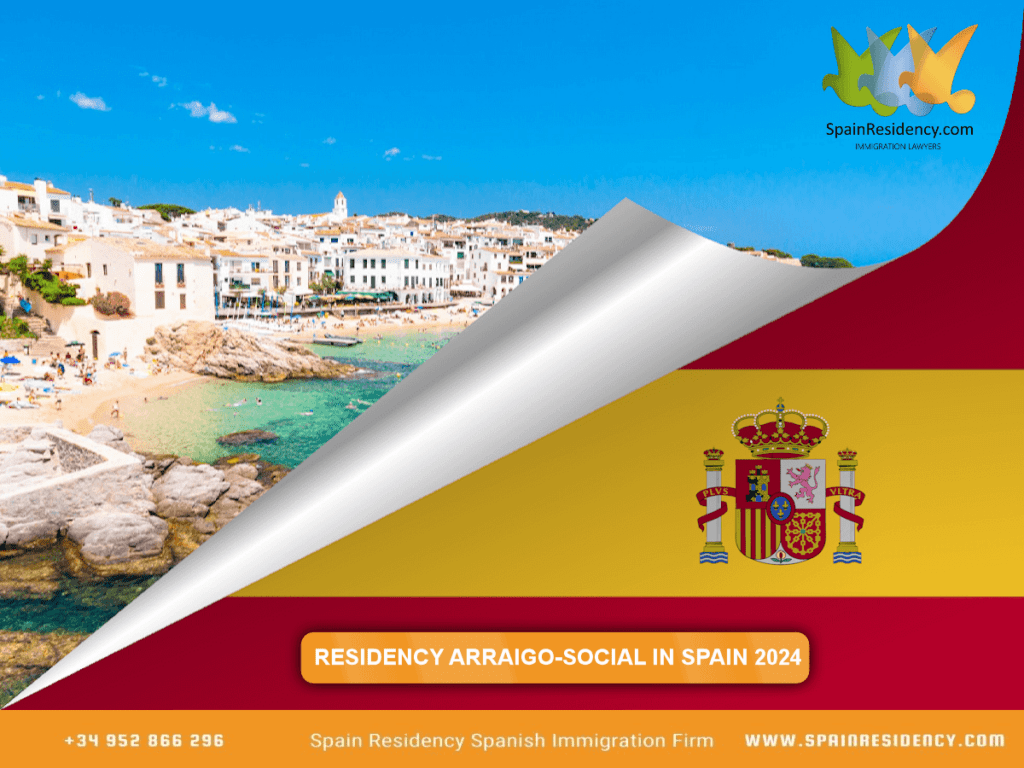Social integration residence through Arraigo-Social in Spain 2024
Menu:
In this post we cover the following: (click any section to see its content)
A complete guide on how to obtain residence through Social-Arraigo social integration in Spain.
- REGULATORY FRAMEWORK FOR SOCIAL INTEGRATION »
- RESIDENCE PROCEDURES FOR SOCIAL INTEGRATION IN SPAIN »
- TYPES OF PERMITS GRANTED WITH SOCIAL INTEGRATION »
- REQUIREMENTS FOR SOCIAL INTEGRATION »
- WHEN TO APPLY FOR SOCIAL INTEGRATION »
- WHERE TO SUBMIT THE SOCIAL INTEGRATION APPLICATION »
- APPROVAL OF SOCIAL INTEGRATION »
- REQUESTING THE PHYSICAL CARD »
- RENEWING SOCIAL INTEGRATION RESIDENCY »
- FAQ ABOUT SOCIAL INTEGRATION »
- ALL TYPES OF RESIDENCY AVAILABLE IN SPAIN »
- SCHEDULE AN APPOINTMENT WITH A SOLICITOR »
FRAMEWORK OF RESIDENCY THROUGH SOCIAL INTEGRATION:
Social Integration is a permit through which many people can regularise their administrative status in our country.
This Residence Authorization for Exceptional Circumstances can be processed whether you have never had a residence permit, or if you had one but lost it due to its non-renewal.
RESIDENCE PROCEDURES FOR SOCIAL INTEGRATION:
This residence and/or work permit in Spain is regulated by the following laws or rules:
- Organic Law 4/2000, on the Rights and Liberties of Foreigners in Spain and Their Social Integration known as the Foreigners Law.
- Regulation of Organic Law 4/2000, approved by Royal Decree 557/2011, of April 20 Immigration Regulation.
- Royal Decree-Law 19/2012, of May 25, on urgent measures of liberalization of trade and certain.
- Law 39/2015, of October 1, on the Common Administrative Procedure of Public Administrations.
TYPES OF PERMITS GRANTED WITH SOCIAL INTEGRATION:
As mentioned earlier, Social Integration is a temporary residence permit for exceptional circumstances that can be granted to foreign citizens in Spain, either with family ties in Spain or who are socially integrated.
This permit can be for residence only or for residence and work, either as an employee or self-employed. The authorization is valid for one year and can be renewed near its expiration to continue legally staying in Spain.
REQUIREMENTS FOR SOCIAL INTEGRATION:
The requirements to obtain this type of residence and/or work permit are:
- Not being a citizen of a European Union State, the European Economic Area, or Switzerland, or a family member of citizens from these countries subject to the Union regime.
- Having no criminal record in Spain and in previous countries of residence for offenses under Spanish law.
- Not being prohibited from entering Spain and not being listed as rejectable in the territorial space of countries with which Spain has signed an agreement to that effect.
- Not being within the commitment period not to return to Spain, which the foreigner assumed when voluntarily returning to their country of origin.
- Having stayed in an irregular status, continuously in Spain for a minimum of three years, absences from Spain should not exceed 120 days.
- Having family ties (spouse or registered partner, ascendants or descendants in the first degree and direct line) with other resident foreigners or Spaniards, or presenting a report proving social integration issued by the Autonomous Community (or the City Council if authorized by the Autonomous Community) where they have their habitual residence.
- Having a work contract signed by the worker and employer, ensuring at least the minimum interprofessional salary or the established salary, if any, in the applicable collective agreement, at the time of the application. The total sum should represent a weekly workload of no less than thirty hours globally and guarantee at least the minimum interprofessional salary.
The contract may have a duration of a minimum of 20 hours in cases where it is proven to have dependents or persons requiring support measures for the exercise of their legal capacity. More than one employment contract can be submitted in the following cases:
– In the agricultural sector, the submission of two or more contracts with different employers, concatenated, is allowed, each of them.
– In the case of activities in the same or different occupations, working partially and simultaneously for more than one employer, the submission of several contracts will be allowed.
– The company or employer must be registered with Social Security and be up to date with their tax and Social Security obligations.
– The company must also guarantee continuous activity, have the economic, material, or personal means to address its business project and the obligations arising from the contract. If it is a natural person, it must demonstrate, once the salary payment is deducted, 100% of the IPREM if there are no dependents (600 euros per month in this year 2024).
– In the case of a family unit with two members, it is 200% (1200 euros in this year 2024). If the family unit includes more than two people, the amount above must be added to the 50% of the IPREM for each additional member (1200+300 euros).
– In the agricultural sector, two contracts with different employers and concatenated, with a minimum duration of six months each, can be submitted.
– The presentation of several contracts in the same occupation, working simultaneously for more than one employer, all with a minimum duration of one year and whose sum must represent a weekly workload of no less than 30 hours globally, is also allowed.
Is Social Integration without a contract possible?
As you can see, to process this type of authorization in Spain, it is necessary to have a job offer for a duration of one year on a full-time basis.
But if you don’t have that employment contract, can you apply for Social Integration?
If you don’t have a job offer or any employer willing to offer you a job contract, you can apply for Social Integration without a job contract.
In this case, you have two options:
- Social Integration as Self-Employed
Social Integration can also be done by creating your own business and working as self-employed in Spain.
To do this, you will need to prove:
– A Business Plan. Within this business plan, you must specify who your clients will be, what activity you will develop, how much you estimate to generate, what your expenses will be, etc.
– You must also prove that you have the economic means necessary to invest and start your business. The regulations do not establish a minimum amount that we must invest; it will depend on the business activity you want to develop.
– If you want to develop the activity in a location, you must provide the corresponding rental contract for the business. - Social Integration as a Self-Employed Entrepreneur (currently being developed)
Another option which is currently being developed by the governmnet is to apply for Social Integration as a self-employed entrepreneur. This option is designed for those who have a business project, but it is not yet possible to apply for as it is in the process of development.
The requirements will be: - Business Plan detailing the business project you want to develop in Spain.
- Commitment to register with Social Security and the Tax Agency once the project is underway.
Once the authorization is obtained, you have one year to start your business in Spain and apply for the corresponding self-employment permit.
Once the one-year period has elapsed, you can apply for the corresponding self-employment permit in Spain, as long as you have registered with Social Security and the Tax Agency.
WHEN TO APPLY FOR SOCIAL INTEGRATION:
You can apply for Social Integration at any time, as long as you meet the requirements.
However, if you are in Spain, keep in mind that the application for a residence permit must be processed before the expiration of your legal situation.
WHERE TO SUBMIT THE SOCIAL INTEGRATION APPLICATION:
The application for Social Integration can be submitted electronically through the electronic office of the Immigration Office or in person at the immigration office corresponding to your place of residence.
Our recomendation to increase your chances of success, is that applicants should use the assisatnce of a Spanish legal body to assure the application, documentation and follow-up is correct. You can click-here » to contract our legal services.
APPROVAL OF SOCIAL INTEGRATION:
Once the Immigration Office receives your application, they will review the documentation and, if everything is in order, grant you a temporary residence authorization for Social Integration.
REQUESTING THE PHYSICAL CARD:
After receiving the approval, you must request the physical card at the immigration office or police station iniated in the resolution.
RENEWING SOCIAL INTEGRATION RESIDENCY:
The initial authorization for Social Integration is valid for one year. To continue residing and working in Spain, this must be renewed before it expires.
To renew Social Integration, you must submit the renewal application and provide the required documentation, demonstrating that you continue to meet the requirements.
FAQ ABOUT SOCIAL INTEGRATION:
- Can I apply for Social Integration without a job offer?
Yes, you can apply for Social Integration without a job offer. In such cases, you can either create your own business and work as self-employed or apply as a self-employed entrepreneur. - What happens if I don’t renew my Social Integration?
If you don’t renew your Social Integration before it expires, you may lose your legal status in Spain. It’s essential to adhere to the renewal process to avoid complications. - Can family ties be considered for Social Integration?
Yes, family ties such as a spouse, registered partner, ascendants, or descendants in the first degree and direct line can be considered for Social Integration. Additionally, a report proving social integration issued by the Autonomous Community or City Council can be presented. - Can I change my job after obtaining Social Integration?
If you want to change your job after obtaining Social Integration, you may need to update your documentation and inform the relevant authorities about the change. It’s advisable to consult with immigration services for guidance on specific cases. - Is it possible to travel outside Spain with Social Integration?
Yes, it is generally possible to travel outside Spain with a valid Social Integration permit. However, it’s essential to check specific travel regulations and requirements to ensure a smooth return to Spain.
ALL TYPES OF RESIDENCY AVAILABLE IN SPAIN:
- Golden-Visa Spain (Spain citizenship by investment)
- Non-Lucrative visa Spain (Spain visa non lucrative)
- Self-Employed visa Spain (self employed expats in Spain)
- Digital-Nomad visa Spain (remote worker in Spain)
Please see-here our video-blog with options and legal-advice to obtain residency in Spain.
Remember that immigration procedures and immigration regulations change regularly, so it’s crucial to stay updated with the latest information from reliable sources. If you have specific questions or concerns about your situation, it’s advisable to consult with immigration authorities or legal professionals specializing in immigration matters, please click-here » to do this.
In conclusion, obtaining Social Integration in Spain involves fulfilling specific requirements, submitting the necessary documentation, and following the application process. Whether you have a job offer or plan to be self-employed, it’s essential to adhere to the guidelines and keep your legal status up to date. If you encounter any challenges or have uncertainties, seeking guidance from immigration authorities or professionals can be beneficial.
DO YOU REQUIRE ASSISTANCE TO OBTAIN RESIDENCY IN SPAIN?
We are a Spanish Solicitor and assist our clients with all types Spanish legal processes.
Permanent residency is obtained after 5 years of Spanish Residency through Self-Employed Residency, Digital-Nomad, Non-Lucrative Residency or Golden-Visa. This followed by 5 years as a permanent resident in Spain and means you can then obtain Spanish Citizenship with a Spanish Passport.


